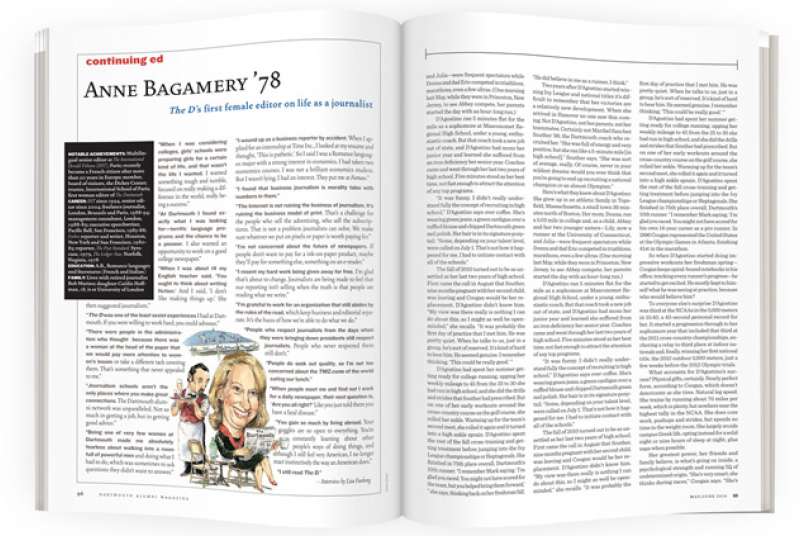
Anne Bagamery ’78
Notable Achievements: Multilingual senior editor at The International Herald Tribune (IHT), Paris; recently became a French citizen after more than 20 years in Europe; member, board of visitors, the Dickey Center; trustee, International School of Paris; first woman editor of The Dartmouth
Career: IHT since 1994, senior editor since 2004; freelance journalist, London, Brussels and Paris, 1988-94; management consultant, London, 1988-89; executive speechwriter, Pacific Bell, San Francisco, 1985-88; Forbes reporter and writer, Houston, New York and San Francisco, 1980-85; reporter, The Post Standard, Syracuse, 1979, The Ledger-Star, Norfolk, Virginia, 1978
Education: A.B., Romance languages and literatures (French and Italian)
Family: Lives with retired journalist Bob Marino; daughter Caitlin Hoffman, 18, is at University of London
“When I was considering colleges, girls’ schools were preparing girls for a certain kind of life, and that wasn’t the life I wanted. I wanted something rough and tumble, focused on really making a difference in the world, really being a success.”
“At Dartmouth I found exactly what I was looking for—terrific language programs and the chance to be a pioneer. I also wanted an opportunity to work on a good college newspaper.”
“When I was about 14 my English teacher said, ‘You ought to think about writing fiction.’ And I said, ‘I don’t like making things up.’ She then suggested journalism.”
“The D was one of the least sexist experiences I had at Dartmouth. If you were willing to work hard, you could advance.”
“There were people in the administration who thought because there was a woman at the head of the paper that we would pay more attention to women’s issues or take a different tack covering them. That’s something that never appealed to me.”
“Journalism schools aren’t the only places where you make great connections. The Dartmouth alumni network was unparalleled. Not so much in getting a job, but in getting good advice.”
“Being one of very few women at Dartmouth made me absolutely fearless about walking into a room full of powerful men and doing what I had to do, which was sometimes to ask questions they didn’t want to answer.”
“I wound up as a business reporter by accident. When I applied for an internship at Time Inc., I looked at my resume and thought, ‘This is pathetic.’ So I said I was a Romance languages major with a strong interest in economics. I had taken two economics courses. I was not a brilliant economics student. But I wasn’t lying. I had an interest. They put me at Fortune.”
“I found that business journalism is morality tales with numbers in them.”
“The Internet is not ruining the business of journalism. It’s ruining the business model of print. That’s a challenge for the people who sell the advertising, who sell the subscriptions. That is not a problem journalists can solve. We make sure whatever we put on pixels or paper is worth paying for.”
“I’m not concerned about the future of newspapers. If people don’t want to pay for a ink-on-paper product, maybe they’ll pay for something else, something on an e-reader.”
“I resent my hard work being given away for free. I’m glad that’s about to change. Journalists are being made to feel that our reporting isn’t selling when the truth is that people are reading what we write.”
“I’m grateful to work for an organization that still abides by the rules of the road, which keep business and editorial separate. It’s the basis of how we’re able to do what we do.”
“People who respect journalists from the days when they were bringing down presidents still respect journalists. People who never respected them still don’t.”
“People do seek out quality, so I’m not too concerned about the TMZ.coms of the world eating our lunch.”
“When people meet me and find out I work for a daily newspaper, their next question is, ‘Are you all right?’ Like you just told them you have a fatal disease.”
“You gain so much by living abroad. Your goggles are so open to everything. You’re constantly learning about other people’s ways of doing things, and although I still feel very American, I no longer react instinctively the way an American does.”
“I still read The D.”
—Interview by Lisa Furlong










